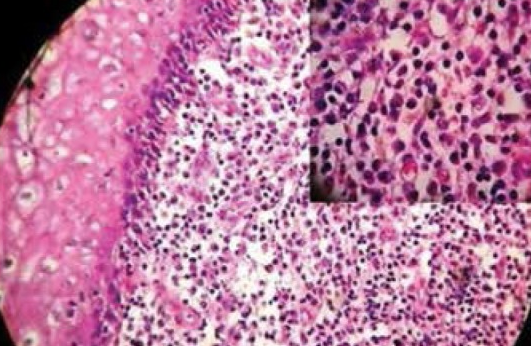Welcome back! Last week, we talked about a rare disease, Lupus. If you missed that blog and would like to catch up, click HERE.
This week, we are going to touch on a woman’s issue, and one that those who have it say they “wouldn’t wish it on anyone“. It’s called Plasma Cell Vulvitis (PCV).
Because of the nature of this disease, and the fact that youth often read my blogs, I’m choosing not to post pictures. You can google the disease and look at images yourself if you want to, but you will not find them here to protect the privacy of the patients and to give parents an opportunity to discuss female anatomy with their children ahead of a visual.
What is it?
(PCV) is a rare chronic inflammatory skin condition that can affect the skin of the vulva. What causes it? The cause of PCV is unknown. It is a benign (non-cancerous) condition, is not due to an infection, and can not be transmitted to other people.

The above photo explanation: histopathological examination shows dense infiltrate of plasma cells in the upper dermis. Inset shows high power view revealing abundant plasma cells and extravasation of red blood cells
Often mistaken for a urinary tract infection (UTI) due to the burning and stinging when one urinates, PCV is not a UTI.
The NCBI reports in an article written by Pravin R. Bharatia, Avinash M. Pradhan, and Vijay P. Zawar that PCV is an extremely rare, idiopathic vulval dermatosis with less than 50 cases reported in the literature. It usually occurs between the ages of 50 and 80. This disease can be without symptoms or extremely itchy.
What are the symptoms?
Women with PCV describe symptoms of burning, itching, and/or soreness on the inside of the small lips of the vulva. These symptoms can interfere with daily living activities such as wearing clothing, sitting, and or walking. They may describe stinging or burning when they urinate. PCV can also make any sexual activity uncomfortable. If the vaginal skin is involved, a woman may note some abnormal vaginal discharge and or bleeding.
How is it diagnosed?
The NCBI suggests a mucosal biopsy from the affected area is usually helpful in arriving at an accurate diagnosis. It is important to note that, the lesions of PCV are chronic, but generally not precancerous. “PCV should be considered in a patient complaining of long-standing vulvar itching with persistent erythematous mucosal plaque(s)“.
Why is it often misdiagnosed?
Because it can mimic other diseases such as contact dermatitis, erosive lichen planus, lichen sclerosus et atrophicus, pemphigus, mucous membrane pemphigoid, lupus erythematosus, drug reaction, extramammary, Paget’s disease, genital psoriasis, and squamous cell carcinoma, all of which will need to be ruled out before an exact diagnosis can be determined.
Is there any treatment?
Treatment options include mid-potency topical steroids, topical calcineurin inhibitors like 0.1% tacrolimus ointment or 1% Pimecrolimus cream, topical immunomodulator like imiquimod have been attempted with varying success. Surgical excision, liquid nitrogen cryotherapy, and carbon dioxide laser ablation may help.
The Journal of Women’s Health Care states that with proper diagnosis and treatment, a full recovery is possible. They go on to say,
“Though the clinical presentation and the pathology of PCV are
well described in many case reports, therapeutic studies are lacking.
Physicians should consider PCV when evaluating vulvar dermatoses.
Further studies on the treatment of PCV are needed in order to develop
guidelines for practitioners to manage this often recalcitrant disease.
Although rare, PCV can cause serious discomfort and psychosocial
distress to patients and warrants further investigation.“
If you or someone you know appears to have this rare disease, please consult with a doctor. This blog is not a replacement for sound medical advice, and many diseases, disorders, and syndromes have symptoms that overlap. Only a physician can diagnose you. That said, if you think this blog may be helpful to others, please hit the Facebook Icon and share it on your personal pages. Thank you for reading us, we really do appreciate you!

1 Comment